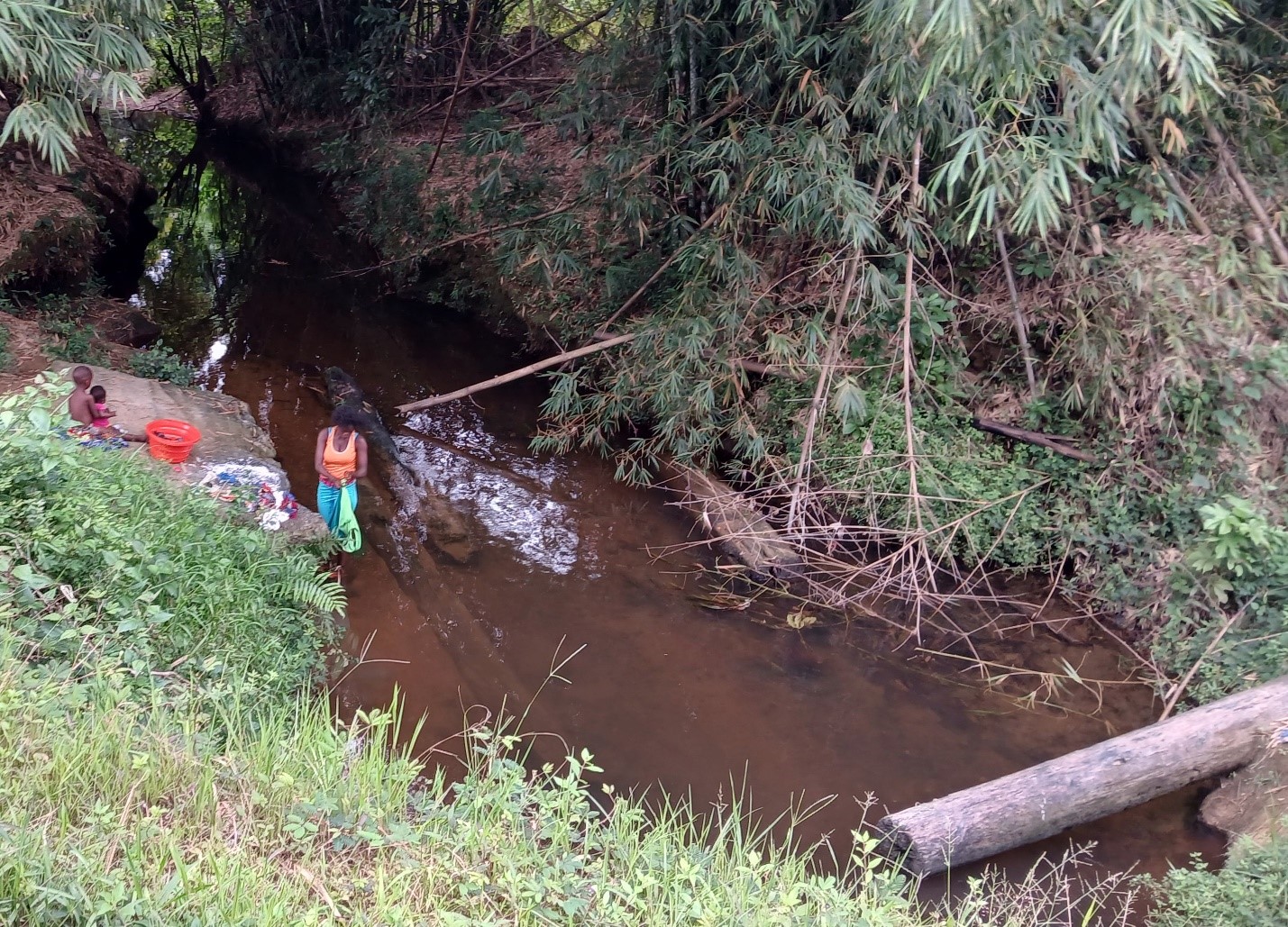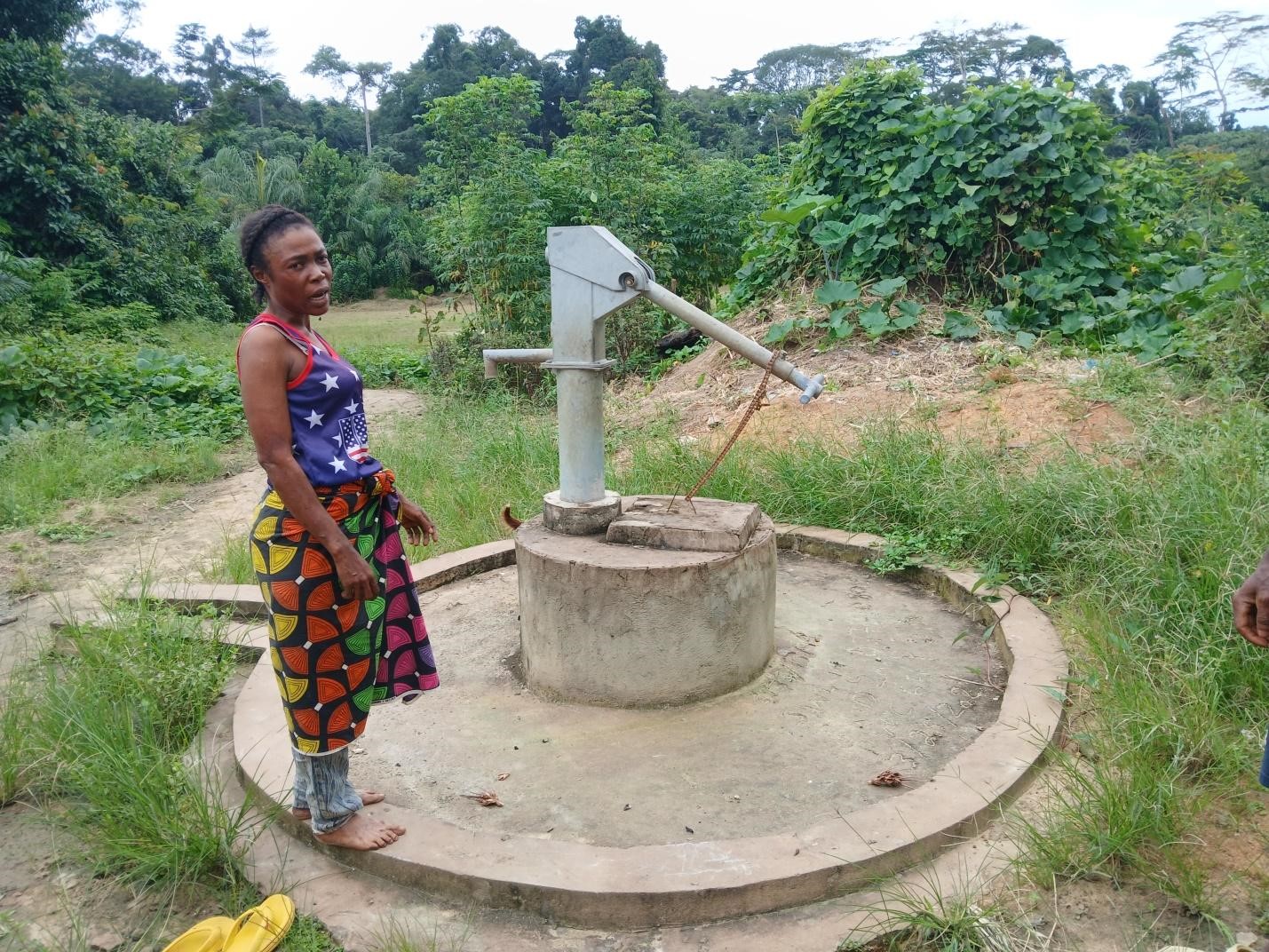Since the community agreed to allow them to log, there has been one problem after another.
By Eric Opa Doue with New Narratives
Now Madam Morris, a single mother in her 30s, is struggling to keep the business going. She has reduced the quantity of food she prepares each day and increased prices. But this is driving away costumers. She is having to make tough decisions about her to children’s school fees.
“I have to buy plastic water because the water from the pump is not enough and I don’t have enough containers to keep water in,” says Madam Morris. “So, the money I supposed to use to pay their school fees, I use it to buy water.”
Water has become scarce in this community and those that surround it, causing serious hardship for people here.
They believe they know who is to blame. In 2018 EJ&J/Brilliant Maju Logging company signed a five-year social agreement with the Teekpeh/Ziadue Community Forest Management Body. EJ&J is owned by Liberian businesswoman Eliza D.J. Kroyahn. Brilliant Maju is a Malaysian company. The 2006 Forest Reform Law gives Liberian owners right to partner with foreign companies once they are awarded concessions by the Forestry Development Authority (FDA). Foreign companies are required to have a Liberian partner in order to operate in Liberia.
Since the community agreed to allow them to log, there has been one problem after another. In 2022 New Narratives/Front Page Africa reported the company had failed to deliver 16 wells and hand pumps in affected communities and to protect water collection points in the area. They also failed to pay $US10,500 as scholarship funds for children in the affected communities.
At the time the company claimed it had not been able to log because of Covid shutdowns. But NN/FPA reporting showed it had exported about $US3m of logs between 2018 and the COVID pandemic. The company now claims it has not done any logging since then.
 Odel Morris keeps water in containers for her business: Photo by Eric Opa Doue
Odel Morris keeps water in containers for her business: Photo by Eric Opa Doue
In the meantime the problems that the community hoped would be fixed by the agreement have become worse. Zammie Town, one of the 16 affected communities, now has a population of more than 7000 with just wells with two hand pumps – one constructed by the Association of Evangelicals of Liberia and the other, started by EJ&J and completed by a son of the community. The community says the company abandoned the project.
The population of the communities has been growing, increasing demand for water, at the same time as climate change is reducing water levels. With so few wells the water is now rationed, according to Blessing Nagbe, the town chief. One well is open for a few hours on Wednesdays and Sundays, while the other is open on Tuesdays and Fridays.
 Kpageeyah Community uses one creek for washing, bathing, latrine and drinking: Photo by Eric Opa Doue.
Kpageeyah Community uses one creek for washing, bathing, latrine and drinking: Photo by Eric Opa Doue.
New Narratives/FPA visited one of the company’s forest landing sites in May and counted 700 round logs that appeared to be abandoned. A second visit in August found 197 logs – mostly Ekki and Dahomey trees – at another of EJ&J’s landing sites.
“There is no good water in this whole area,” says Madam Morris. “The company doesn’t care if what they are doing to the waters will have any negative effect on us. All they know is to get their logs, so whether the log is across the creek, they can do anything to get it from there.”
But Sampson Williams, an environmental activist at the Sustainable Development Institute, who holds a master’s degree in environmental science from the University of Liberia, says he has no doubt the company is creating environmental problems.
“In environmental research, you might need a scientific proof to say yes, the company activity is impacting the water, but in social economic survey like this, you conclude also by observation,” says Mr. Williams. “We were there, and we observed, we saw it and we have pictures. We saw the company blocking water sources altogether that the water cannot move. Their actions are wrong, and it needs no scientific proof.”
After numerous attempts to get response from the company, Stanley Whilzar, coordinator of EJ&J, admitted in a phone call that the company had failed to implement the social agreement. But, as Whilzar wrongly claimed in 2022, he again said the company had been unable to comply with the agreement because they had not been able ship logs.
“We agree that we owe them, but if we do not do business, we cannot implement Social Agreement,” Mr. Whilzar said. “Since we started operations, we have only shipped two times, and we constructed three hand pumps.”
NN/FPA found just one hand pump and well had been constructed by EJ&J in the communities. Even that pump did not last.
Hanna Whama, a leader in Kpageeyah, the town where the well and hand pump were constructed, says it was only completed because of a series of protests by the community blocking the company’s trucks from entering the forest.
“The pump not make two months and now we taking water from to the creek,” says Whama who is worried about the health impacts. “To the creek, there where the children can go in the rest room. That the place we can wash, and that the same place we can take drinking water from.”
 There is only one nonfunctional hand pump in Kpageeyah: Photo by Eric Opa Doue.
There is only one nonfunctional hand pump in Kpageeyah: Photo by Eric Opa Doue.
“The logs were abandoned because the community set roadblock in demand of their social benefits at the time we got ready to ship the logs,” says Mr. Whilzar. “So, the ship left, and we were unable to ship our logs.”
He denied the logs were abandoned.
“Any log that you fell and it enters the company’s record or database, it becomes the property of the company,” says Whilzar. “Even though the community has share, but the company decides what to do with the logs.”
 Logs scattered in the forest at various EJ&J landing sites verified by NN/FPA: Photo by Eric Opa Doue:
Logs scattered in the forest at various EJ&J landing sites verified by NN/FPA: Photo by Eric Opa Doue:
The communities made numerous complaints to the FDA under Weah administration managing director Mike Doryen. In 2022 NN/FPA found the agency had repeatedly failed to act. That has continued according to Fredrick James, head of the Community’s Land Development Management Committee.
“Lot of things they did and we forward our complaints to the FDA,” says Mr. James. “We have not been getting any result of all the complaints that been going to FDA.”
 They community blames EJ and J for felling logs into waterways, contaminating the water. Photo by Eric Opa Doue.
They community blames EJ and J for felling logs into waterways, contaminating the water. Photo by Eric Opa Doue.
“Trees that fall along the river are not to be cut,” says Madam Wilson. “Because once you cut it, the water is vulnerable to drying or to any other thing.”
Madam Wilson says her new boss, FDA Director Rudolph Merab, is working on a new law to address the problem of abandoned logs.
“He went around for inspection, and he saw a lot of abandoned logs in the forest, and he said he was going to come up with a law to tell these companies what to do with these logs. Because if you check in most of these forests, you feel bad. These guys come and just damage the trees, cut it down and abandoned it.”
The rapid loss of Liberia’s forest in the last 20 years has caused alarm inside and outside the country. According to a WorldRainforests Report, Liberia lost 25 percent of its tree cover between 2001 and 2020. Of this number, River Cess accounts for 17 percent. As one of West Africa’s most forest-rich countries, its rainforests are vital for biodiversity and climate regulation. But the deforestation rates have accelerated, threatening wildlife habitats and the livelihoods of local communities like Zammie Town, Kpageeyah that rely on forests for resources.
Recently, representatives of EJ&J have been asking the community to allow EJ&J to resume operations. The community says that will not happen until the company meets its obligations.
This story was a collaboration with New Narratives as part of its “Investigating Liberia” project. Funding was provided by the Swedish embassy in Liberia. The funder had no say in the story’s content.


